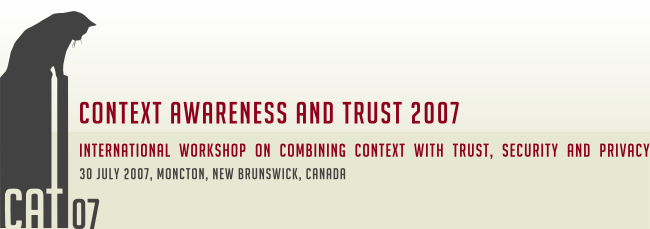Important Dates
- Papers submission:
9th May 2007
14th May (abstract)
20th May (paper) - Notification of Acceptance:
27th May 2007
3rd June 2007 - Final version due:
17th June 2007
- Workshop:
30 July 2007
Other Editions
Attention - Proceedings and slides available
Proceedings of Context and Trust (CAT07),
First Workshop on Combining Context and Trust, Security and Privacy,
B. Hulsebosch, G. Lenzini, S. Toivonen, and M. Wegdam (eds.),
CEUR Workshop Proceedings, ISSN 1613-0073, vol. 269, 2007
The slides can be found at the Programme page
Goals
The CaT workshop aims to stimulate an active exchange of new ideas on the mutual relationship between the area of context awareness and the area of trust, privacy & security. The CaT workshop aims to bring experts together, to collect the state of the art, to identify open and emerging problems, and to propose future research directions. The workshop attendees will explore related work, theoretical frameworks and applications which focus on the relationship between these domains.
Motivations
Most human activities involve making explicit or implicit decisions with regard to trust. Moreover, the trustworthiness evaluation process, which includes security and privacy and which influences the decision-making, can also be used to model systems consisting of software programs. The notion of context can be considered as input for the decision- making process. Context awareness refers to situational details characterizing the entities involved in the trust relationship, as well as the environment surrounding them. These details can be considered to make difference with regard to whether to trust or not.
Context awareness on one side, and trust, privacy & security on the other side, have both gained significant interest as independent research fields. For the above-mentioned reason, however, considering them together and explicating their inter-relationship is envisaged to be useful. Factors contributing to this motivation include the vast expansion of sensor networks and the advancement of mobile computing, which entail new paradigms such as ubiquitous/pervasive computing, as well as ambient intelligence.
Until now the interdependencies between context awareness on one side, and trust, privacy & security on the other have not been sufficiently addressed. Whilst new threats against security, privacy and trust go along with context awareness, the availability of context information can also offer new opportunities to establish, to enhance and to manage trust, privacy and security. For example, the location of a user can have impact on which services or content are provided to the user. Alternatively, the user's current role or social context can determine the degree of trust others establish towards the user.
Workshop Relevance
The CaT workshop looks at the evolution of today's infrastructures towards more pervasive and ubiquitous context aware infrastructure, and it observes in this new challenges and new opportunities regarding privacy, trust and security. The focus on cross pollinating trust, security and privacy with context awareness will bring new insights and food for thought and will provide an interesting playground for the IFIPTM community. In particular:
- the opportunity to use context as an opportunity to enhance privacy, trust or security seems an interesting, innovative, and value-adding extension to IFIPTM. For example, the availability of context information can help the establishment of trust relationship (users in the same room for the same meeting are more willing to trust each other). Moreover, contextual information can be used to improve dynamic, adaptive, and autonomic aspects of security, access control, and privacy control/enforcement.
- the opportunity to apply the results achieved in security, privacy, and trust to strengthen context aware infrastructures and to facilitate the exchange of context information is a challenge for IFIPTM community. For example, because context information often has a personal character, privacy and other rights of individuals must be carefully protected. Moreover, trust is an essential prerequisite for secure exchange and usage of context information at different quality levels (i.e. Quality of Context).
The workshop primarily addresses researchers with a computer science background and researchers from other relevant disciplines such as, for example, legislation, usability design, social and behavioural sciences.







